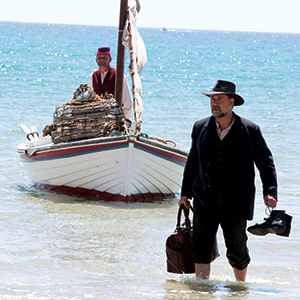

leaves Australia for post-WWI Turkey in search of his sons.
Essentially bad, but certainly engrossing, like an unusually well-researched supermarket novel, Russell Crowe‘s feature-film directorial debut is full of visual scope and rich color. Shortly after the end of the Great War, in 1919, Connor (Crowe) is an Australian farmer from Victoria state who has the gift to witch out water. After he is widowed, Connor decides to use his penchant for finding things hidden underground to discover the final resting place of his three sons—killed in Turkey at the battle of Gallipoli.
There may be some beating up on this film, but like the dingo-ate-my-baby movie (it’s called A Cry in the Dark, and it’s excellent), The Water Diviner deserves honor for dealing with history likely considered too sad to make a box office killing. As the end titles suggest, the number of WWI soldiers reported missing-in-action broke the hearts of surviving relatives; you can read of Kipling’s doomed efforts to find the body of his own dead son. Nobly observing the centennial of this Anzac calamity, Crowe stages the deaths of three brothers at the front to make it both wrenching and squalid. Men are not permitted to cry at much, but as in Peter Weir’s 1981 Gallipoli and the Pogues’ tune “The Band Played Waltzing Mathilda” we are granted permission here.
Trying to give it all an upbeat finish, Crowe and his screenwriters Andrew Knight and Andrew Anastasios added an unlikely rousing third act, staged against the Greco-Turkish war. Incidentally, Hemingway, who was an essentially bad but certainly engrossing war correspondent, was there a little later. He took the Christian side of the fight, describing it in crusader’s terms as “The Turk’s return to Europe.” By contrast, Crowe and his producers preferred to keep their host country sweet. I’d suggest not taking Greek friends to watch this film; Armenians also might prefer the Disney movie about the monkeys.
Those with no skin in the game will enjoy Yilmaz Erdogan’s Omar Sharif-like character, Major Hasan—an officer and gentleman. These days, any friendly portrayal of a Muslim on a movie screen is refreshing. There are extensive (and glamorous) scenes of vintage Constantinople—replete with bazaars, mosques, a cute impish kid and slightly gratuitous Orientalism. Finally, the movie offers a very pretty Olga Kuryelenko, with whom Connor has a chaste, honorable romance. She compliments the Turkish costumes like no one since Madame Matisse.
R; 111 Min.


